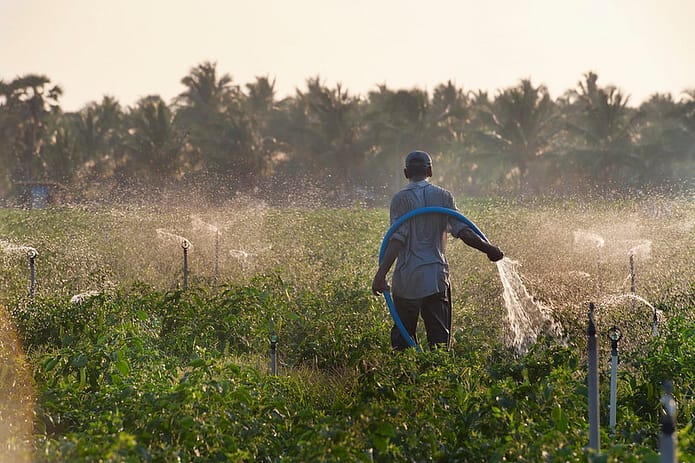Water, Food & Ecosystems
Agriculture is the engine of food security, the largest global user of water and, in developing countries, an important source of employment for poor people. As competition for water intensifies, food systems must become more sustainable and resilient, and better able to meet the nutritional needs of growing population without undermining the landscapes and ecosystems on which they depend. Research is needed to enhance agricultural productivity, develop technologies and policies that promote sustainable agricultural intensification, and identify ways to integrate nature-based solutions into the management of rural landscapes.
Our approach
Water management for water and food security is a change process. IWMI explores new ways to sustainably increase agricultural productivity, increase economic returns, support human wellbeing and safeguard ecosystems and their services in a changing climate. Therefore, water and food production systems (including rain-fed systems, farmer-led irrigation and irrigation schemes) and their dependencies with other systems (e.g., energy) are analyzed using innovative tools and frameworks, and integrated solutions are co-developed with a range of stakeholders. Furthermore, pathways are explored to scale local solutions to sustainably support the resilience of societies.
Sustainable water infrastructure built (grey) or natural (green) and the ‘best blend’ for a given situation plays a key role for inclusive development and for conserving ecosystems. Considering all the water cycle components (including surface water, groundwater, water quality) and their interactions with people and the environment is critical to support effective institutions, policies and investments. We work from local farm scale up to transboundary basins and aquifers
Our research on Water, Food and Ecosystems
- Provides evidence and data analytics for making choices about agricultural water management, business models for farmer-led irrigation or reforms in large-scale irrigation schemes.
- Develops water solutions for sustainable intensification in agriculture (rain-fed and irrigated), including management of groundwater, water pollution, and integration of inland fisheries.
- Expands the application of water accounting to support improvements in water productivity across scale, river basin planning and management, policy development and water-related investments.
- Supports equality and empowerment of women and youth in agricultural water management.
- Assesses the trade-offs and synergies in planning portfolios of built and natural water infrastructure.
- Integrates ecosystem values, services and sustainability into water resource allocation and management practices, and water infrastructure design and operations.
- Supports the implementation of environmental flows and conservation of biodiversity.
- Develops knowledge on the hydrological impacts of restoration and applications to strengthen water security through wetland and watershed rehabilitation.
- Ensures that governance and incentives for protection and restoration of water-related ecosystems strengthen equality and inclusion.
- Combines data, processes and institutions for integrated surface water and groundwater management, including in transboundary basins.
Contact
Latest publications on this topic

Journal of Hydrology: Regional Studies, 2025
More... [DOI] | Fulltext (12.3 MB)

Environmental Challenges, 2025
More... [DOI] | Fulltext (19.4 MB)

Agronomy for Sustainable Development, 2025
More... [DOI] | Fulltext (1.71 MB)

Frontiers in Water, 2025
More... [DOI] | Fulltext (2.23 MB)






